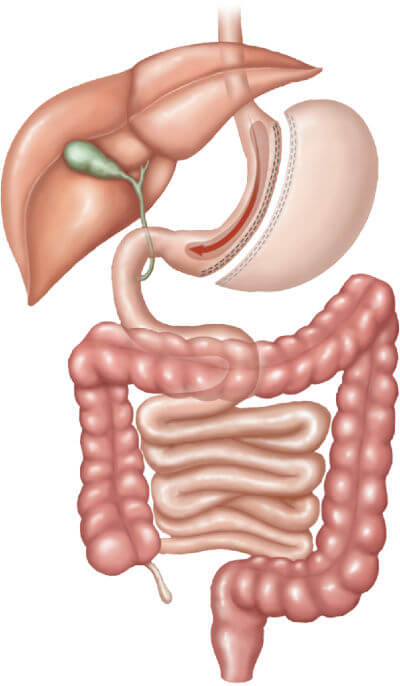Gastric Bypass Surgery General Overview
Author: Ian C. Langtree - Writer/Editor for Disabled World (DW)
Published: 2009/03/14 - Updated: 2020/02/06
Category Topic: Digestive System - Related Publications
Page Content: Synopsis - Introduction - Main
Synopsis: Gastric bypass surgery includes both true bypass operations such as the Roux-En-Y and popular forms of weight loss surgery such as gastric banding. Gastric bypass surgery is not a "quick fix" for obesity. You must diet and exercise after surgery. You also need to know about the risks of surgery, and what your life will be like after the surgery.
Introduction
Gastric Bypass Surgery assists you to lose weight by changing how your stomach and small intestine handle the food you eat. After the surgery, your stomach will be smaller. The food you eat will no longer go into some areas of your stomach and small intestine that further break down food. Because of this, your body will not absorb all of the calories from the food you eat. Gastric bypass surgery is not a "quick fix" for obesity. You must diet and exercise after surgery. You also need to know about the risks of surgery, and what your life will be like after the surgery.
Main Content
We tend to use the term gastric bypass surgery somewhat loosely these days and include both true bypass operations such as the Roux-En-Y and popular and less radical forms of weight loss surgery such as gastric banding.
While both have a role to play in curing the problem of obesity, bypass surgery takes full advantage of the body to affect weight loss and, in order to understand just how gastric bypass surgery works, it is necessary to have a basic understanding of the digestive system.
Digestive System

The process of digestion begins as soon as you start to eat when, as you chew your food in your mouth, saliva, which contains the digestive enzyme amylase, is mixed with your food and starts to break down carbohydrates.
Although it may not seem an important part of the digestive system, the saliva glands produce about 40% of the amylase used in the digestive process and so chewing your food properly is an essential part of the process.
Food is then passed down the esophagus and into the stomach where muscular contractions mix the food as digestive juices and pepsin are added. In adults the stomach typically holds the equivalent of about 3 pints.
Once thoroughly mixed the food is passed out of the lower end of the stomach through the pylorus, a circular muscle which opens and closes rhythmically to control the flow of food from the stomach.
Having left the stomach food enters the duodenum, which is about 2 feet in length and it the first of three sections that together form the small intestine. Here two other organs of the body come into play - the liver and the pancreas.
The liver passes bile, which is an essential enzyme used in the digestion of fat, into the duodenum and also receives essential nutrients from the duodenum through a series of veins known as the portal veins. The liver itself is thus also responsible for processing food products.
The pancreas, which is principally known as the organ which is responsible for producing insulin, also produces a number of digestive enzymes, including lipase, which mixes with bile in the duodenum to further assist in breaking down fat.
Once food has been mixed with various digestive enzymes in the duodenum it then passes into the jejunum, which is about 6 to 8 feet in length, and then on into the ileum, which is about 10 to 12 feet long, where the digestive process continues and nutrients are extracted.
Once digestion is complete the remaining waste products are passed into the large bowel which plays an important role in absorbing water to prevent excess water loss.
Waste products are then held in the large bowel until they are released from the body.
Gastric bypass surgery consists bypassing part of the small bowel (the duodenum, jejunum and ileum) and restricts the body from absorbing calories from the food that is eaten which, in turn, leads to weight loss. However, it also restricts the absorption of a variety of necessary vitamins and minerals and this explains the need for life-long supplements following surgery.
Related Information
- Gastric Bypass Surgery in Obese Patients - Study examines outcomes of gastric bypass surgery in morbidly obese and superobese patients.
- Safety of Gastric Banding Weight-Loss Surgery in Question - Increasing doubts about safety of Lap Band surgery and similar weight loss procedures.
- Pain and Disability Reduced After Bariatric Surgery - Study reveals clinically meaningful improvements in bodily pain, specific joint pain and physical function are common following bariatric surgery.
 Author Credentials: Ian is the founder and Editor-in-Chief of Disabled World, a leading resource for news and information on disability issues. With a global perspective shaped by years of travel and lived experience, Ian is a committed proponent of the Social Model of Disability-a transformative framework developed by disabled activists in the 1970s that emphasizes dismantling societal barriers rather than focusing solely on individual impairments. His work reflects a deep commitment to disability rights, accessibility, and social inclusion. To learn more about Ian's background, expertise, and accomplishments, visit his full biography.
Author Credentials: Ian is the founder and Editor-in-Chief of Disabled World, a leading resource for news and information on disability issues. With a global perspective shaped by years of travel and lived experience, Ian is a committed proponent of the Social Model of Disability-a transformative framework developed by disabled activists in the 1970s that emphasizes dismantling societal barriers rather than focusing solely on individual impairments. His work reflects a deep commitment to disability rights, accessibility, and social inclusion. To learn more about Ian's background, expertise, and accomplishments, visit his full biography.